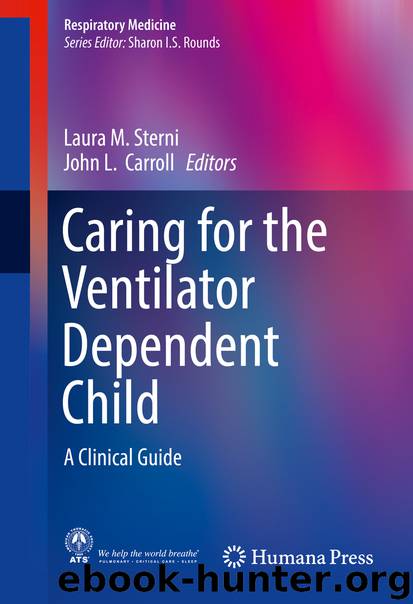Caring for the Ventilator Dependent Child by Laura M. Sterni & John L. Carroll

Author:Laura M. Sterni & John L. Carroll
Language: eng
Format: epub
Publisher: Springer New York, New York, NY
The Human Factor
A vigilant, well-trained caregiver is the best prevention for pediatric tracheostomy and ventilator emergencies in the home. This is equally true for both professional home nurses and family caregivers [14].
Nurses
The nursing profession and the public are concerned with the capacity for nurses to be consistent, vigilant caregivers. Families report that a primary frustration of homecare is a lack of vigilance by the nurses who monitor their children, especially when nurses sleep on the job. It is difficult for families to develop trust, confidence, and rapport with a nurse who has been found asleep. In its extreme, a lack of vigilance due to sleeping by a nurse can lead to the preventable death of a patient [15]. Nursing agencies are responsible for ensuring that work schedules for nurses allow for proper rest between shifts. Agencies are accountable for taking corrective action after families report a nurse sleeping on the job. For the nurse who commits a serious nursing error or is found asleep on the job we recommend reassessment of skill levels, followed by remedial instruction and documentation of completed remedial training by the nursing agency supervisor or clinical educator prior to the nurse returning to the child’s home.
Family caregivers assume most of the responsibility of caring for their medically complex child. Home nursing support, especially night nursing, is vital for the health and well-being of family caregivers of ventilator-dependent children. Studies since the late 1980s have regularly reported sleep disturbances in parental caregivers of technology-dependent children [16–18]. A more recent study found a distinct relationship between home nursing coverage, sleep, and daytime functioning in parents of ventilator-assisted children. In the study, parents with clinically significant symptoms of depression and sleepiness received significantly fewer hours of night nursing [19]. Families rely on nursing agencies to provide enough qualified nurses to fill the number of approved nursing shifts for the child, especially during the night.
Download
This site does not store any files on its server. We only index and link to content provided by other sites. Please contact the content providers to delete copyright contents if any and email us, we'll remove relevant links or contents immediately.
| Administration & Medicine Economics | Allied Health Professions |
| Basic Sciences | Dentistry |
| History | Medical Informatics |
| Medicine | Nursing |
| Pharmacology | Psychology |
| Research | Veterinary Medicine |
Periodization Training for Sports by Tudor Bompa(8253)
Why We Sleep: Unlocking the Power of Sleep and Dreams by Matthew Walker(6706)
Paper Towns by Green John(5178)
The Immortal Life of Henrietta Lacks by Rebecca Skloot(4576)
The Sports Rules Book by Human Kinetics(4379)
Dynamic Alignment Through Imagery by Eric Franklin(4208)
ACSM's Complete Guide to Fitness & Health by ACSM(4057)
Kaplan MCAT Organic Chemistry Review: Created for MCAT 2015 (Kaplan Test Prep) by Kaplan(4006)
Introduction to Kinesiology by Shirl J. Hoffman(3765)
Livewired by David Eagleman(3764)
The Death of the Heart by Elizabeth Bowen(3609)
The River of Consciousness by Oliver Sacks(3599)
Alchemy and Alchemists by C. J. S. Thompson(3515)
Bad Pharma by Ben Goldacre(3422)
Descartes' Error by Antonio Damasio(3270)
The Emperor of All Maladies: A Biography of Cancer by Siddhartha Mukherjee(3148)
The Gene: An Intimate History by Siddhartha Mukherjee(3094)
The Fate of Rome: Climate, Disease, and the End of an Empire (The Princeton History of the Ancient World) by Kyle Harper(3055)
Kaplan MCAT Behavioral Sciences Review: Created for MCAT 2015 (Kaplan Test Prep) by Kaplan(2983)
